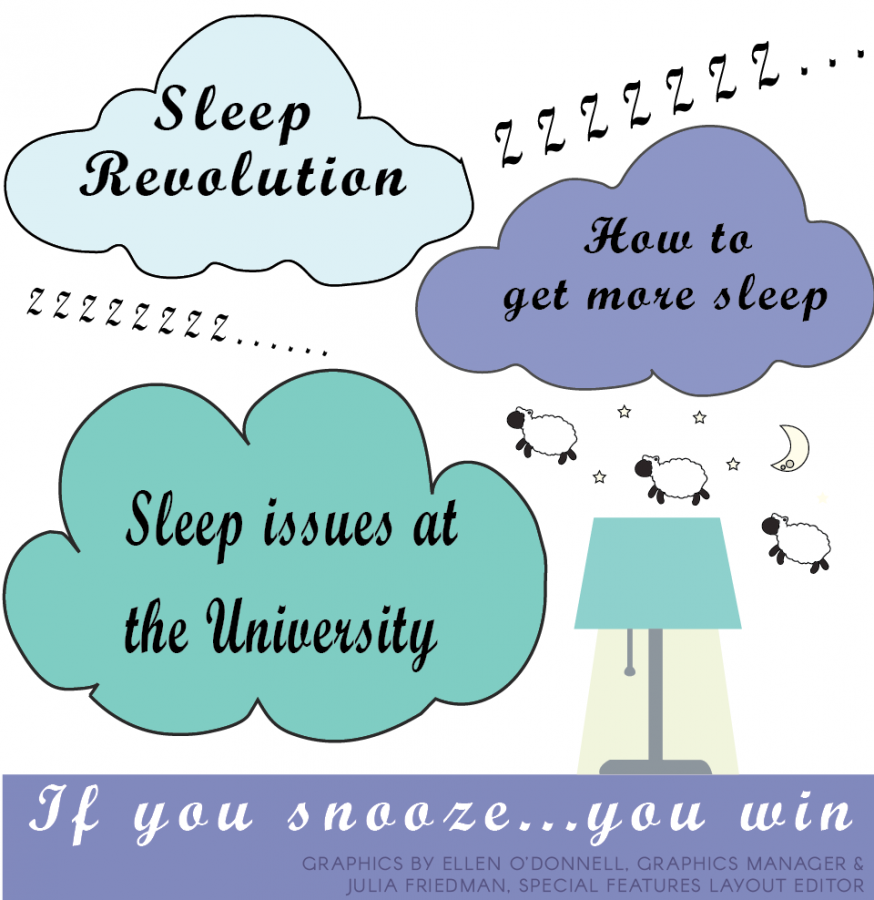If you snooze, you…win
April 7, 2016
The end of the academic year marks an extremely busy time for most college students struggling with academics, clubs, and social obligations. As a result, students have to prioritize their time, often putting sleep at the very bottom of their “to-do” list. Many students view sufficient sleep as a privilege rather than a requirement in their daily routine, which can negatively affect both their physical and mental health. Inspired by Arianna Huffington’s new book “The Sleep Revolution,” we researched the importance of sleeping habits in college and what students can do to catch some much needed z’s on campus.
Sleep Revolution
Huffington, co-founder and editor-in-chief of the Huffington Post, addresses the problem of sleep deprivation that has plagued college campuses worldwide in her new book “The Sleep Revolution.” She contends that our lack of concern for sleep jeopardizes important decision-making skills needed for our work and personal lives. In an effort to promote healthier sleeping habits for college students nationwide, the Huffington Post is advocating for a “sleep revolution” across 50 American universities. The Sleep Revolution College Tour aims to change the way college students view sleep by holding sleep fairs that give out copies of Huffington’s book, snacks, pajamas, sleep gadgets, and more.
Sleep issues at the University
College students are among the most sleep deprived people in the country, and University students are no exception.
“If I go to bed before 1 a.m., I consider it early because I’m usually up doing homework or procrastinating in the library,” Chris Sisto ’18 said.
Students spend countless hours working in the library, especially during finals week when the building is open 24 hours a day.
Catherine O’Neil, Medical Director of Bucknell Student Health, emphasized that spending too much time in the library instead of getting sleep is not healthy or productive. According to O’Neil, a person needs to sleep in order to remember the information recently learned, so pulling all-nighters and cramming actually has negative effects on studying.
O’Neil described how sleep deprivation can lead to problems with coordination, lack of focus, moodiness, and the inability to recover from injuries or illness. These types of problems continue to occur among students at the University.
“I’ll stay up late to finish all of my work, but then I find myself even more stressed out and anxious from the lack of sleep, and it’s harder to get things done the next day,” Molly Farrell ’18 said.
How to get more sleep
O’Neil provided some helpful tips on how students can prioritize sleep.
“The most important thing students can do is plan for sleep; schedule adequate sleep time every day,” O’Neil said.
She also outlined certain things to avoid before sleep including screens, alcohol, and caffeine. Lastly, O’Neil emphasized the importance of creating the optimal environment for a deep sleep. She stated that a cool, dark, and quiet room will lead to the best night’s sleep. For a quick nap in between classes, students remarked that best place to go is the second floor couch room in the library.
“When I’ve been working in the library for a while I go to the couch room on the second floor to catch up on sleep,” Jon Buddenhagen ’18 said.






















